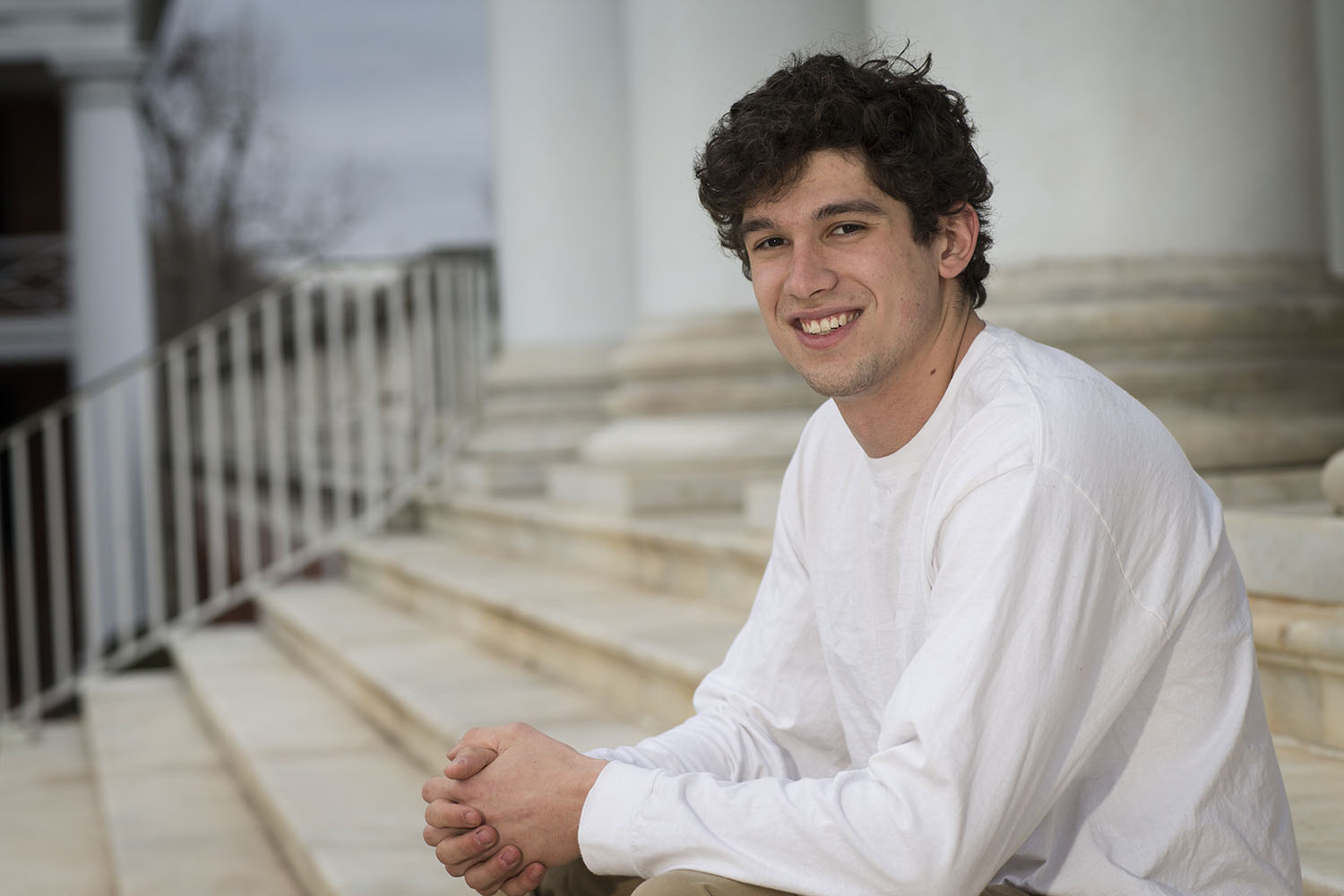The University of Virginia Faculty Senate and Center for Undergraduate Excellence recently announced the recipients of the 2014 Harrison Undergraduate Research Awards. To mark the announcement, UVA Today looks back at what some of the 2013 grantees have learned in the past year.
Matt Lycas is a fraternity brother and a past winner of the Michael J. Fox Pancakes for Parkinson’s pancake-eating contest. He might also one day find a way to cure addiction to cocaine.
A fourth-year neuroscience major at the University of Virginia, he is endeavoring to understand the neurological effect of addiction on the brain. His research was underwritten by a Harrison Undergraduate Research grant.
The Harrison Undergraduate Research Awards program funds undergraduate research projects for one year. Approximately 40 awards of up to $3,000 each are granted on a competitive basis to first-, second- and third-year undergraduate students. Students who receive the awards work closely with a faculty mentor on their research.
“There are very few pharmacological treatments for addiction, and the ones used can have variable efficacy,” said Lycas, 21, a Mount Jackson native. “This is due to an incomplete understanding of what has changed in the brain as a result of the addictive substance.
“This project’s goal is to learn more about the topic of addiction so that it will be possible to treat with greater success in the future.”
Lycas has worked in the lab of Wendy J. Lynch, associate professor of psychiatry and neurobehavioral sciences, who described Lycas as a model student and budding researcher.
“Matt has been working in my lab for three years and has proven to be a valuable asset to my research team,” Lynch said. “He started in the lab working on a project examining potential medications for treating alcohol dependence using rat models under the direction of Dr. Richard Morgan, a postdoctoral fellow in the lab. After Dr. Morgan left the lab two years ago Matt was instrumental in completing the project, particularly the microdialysis component. This component of the study was crucial to the overall project, and without Matt’s assistance, it would have been difficult to complete.”
Lynch said Lycas was experienced with all of the project’s required procedures, including high-performance liquid chromatography, which requires a high degree of training and skill.
“Matt successfully collected and analyzed all the data we needed to complete the project, and in doing so, earned a slot on the manuscript which we are currently submitting for publication,” she said. “I have given Matt a lot of responsibility as he has proven to be capable and reliable.”
Lycas’ work as an undergraduate researcher has earned him co-author credits on two other papers coming from Lynch’s lab.
“In addition to his Harrison project, he is also completing a Distinguished Majors project from his work on a project examining the neurobiological mechanisms underlying the development of an addicted phenotype following extended-access cocaine self-administration,” Lynch said.
Lycas hopes that developing a better model for addiction can lead researchers to develop better treatments to target the problem.
The idea behind Lycas’ research was logical: block certain receptors in various areas of the brains of cocaine-addicted rats, then measure the effects. “This was done to challenge the current understanding of addiction and to create a better understanding of the neural circuitry underlying addiction,” he said.
Lycas got into neuroscience because he took a class on it in high school and enjoyed the challenge.
“I learned that hard work can lead to really cool explanations for everyday phenomena,” he said. “I was drawn to it because it the information was so new. Major discoveries were being made all the time. This is not only exciting but also highlights the importance of new research.”
In the beginning, he took a simpler view of neuroscience, which has been replaced with a richer appreciation of what is involved.
“At first I assumed that I would find a circuit or chemical reason for complex behavior, and be able to break everything down to calculated components,” he said. “Now it is becoming clear that the level of examination becomes more and more complex. Nothing is ever fully explained, it just requires questions from a new or different discipline.”
Working with rats can be challenging because they require constant maintenance, but he said the results found can be substantial.
“Important parallels can be drawn between the rodent and human brain, and it allows for more invasive investigations to be performed,” he said. “We were looking at a specific aspect of addiction that would be impossible to isolate in a human study.”
Lycas is also busy outside the lab. He is a counselor for the Inter-Fraternity Council Judiciary Committee, a brother and risk manager of the Alpha Chapter of Chi Phi and a speaker at the Atlantic Coast Conference Research Symposium. He plans to pursue a Ph.D. and further his research career to continue investigating neuropharmacology and addiction studies.
“It was a good learning experience, and helped me realize that I want to make work like this my career,” Lycas said. “There’s a lot one can gain from these animal studies. It’s made me realize that there is still much more to learn about neural circuitry that has, until now, seemed solidly outlined in textbooks. There will be plenty more work in uncovering just how common behaviors translate to real changes in the brain.”
Lynch said Lycas is an excellent student and has a bright future.
“I am truly impressed with Matt’s level of skill and his reliability,” she said. “He also has an incredible work ethic: always arrives on time for his scheduled hours, completes all assigned duties and he frequently stays much longer than scheduled to help with various experiments and gain additional training.”
Media Contact
Article Information
March 13, 2014
/content/student-research-understanding-rat-brains-may-lead-addiction-treatment

